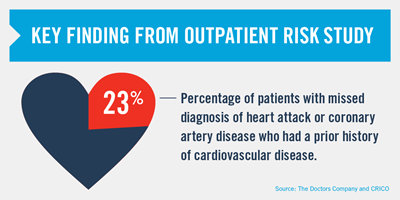Heart Health Month helps raise awareness of heart disease and offers motivation to people to adopt healthy lifestyles to prevent heart disease. It is also an opportunity to provide insights about potential risks and vulnerabilities in diagnosing cardiovascular disease which clinicians and health care leaders can leverage to improve patient care.
CARDIOVASCULAR DISEASE
Nearly half of all Americans (47%) have at least one of three key risk factors for heart disease: high blood pressure, high cholesterol, and smoking.1 Other medical conditions or lifestyle choices that can increase one’s risk for heart disease, include:
- Diabetes
- Obesity
- Physical inactivity
Cardiovascular disease can be challenging to diagnose in the ambulatory setting, and when doctors miss this diagnosis, the patient often has conventional risk factors for coronary artery disease. This is according to an analysis published in The Joint Commission Journal on Quality and Patient Safety, performed by The Doctors Company and CRICO Strategies.
GENERAL PRACTITIONERS AT RISK OF MISSING CVD
In the study, Missed Diagnosis of Cardiovascular Disease in Outpatient General Medicine: Insights from Malpractice Claims Data, researchers looked at 251 closed medical malpractice cases in the Candello database where patients alleged that the general medical practitioner who treated them in an outpatient setting missed a cardiovascular diagnosis.2 These cases were more likely to result in higher severity injury than malpractice claims in general, the study showed.
Key findings included:
- Almost a quarter of the patients in the analysis who were eventually diagnosed with myocardial infarction or coronary atherosclerosis had a history of prior cardiovascular disease—one of the highest pretest predictors of cardiovascular disease.
- The majority of patients with missed outpatient coronary artery disease had initial diagnoses that were either nonspecific or common disease mimics (for example, esophageal reflux or musculoskeletal pain), despite the high prevalence of cardiovascular risk factors among those patients.


“What was most surprising from these results was cardiovascular malpractice claims in outpatient general medicine occur predominantly in patients with typical risk factors of cardiac disease rather than in low-risk patients,” said Gene R. Quinn, MD, MS, MPH, co-author of the study. “In short, physicians aren’t just missing the hard diagnoses.”
Researchers concluded that prior to diagnosing esophageal disease or using a nonspecific diagnosis in ambulatory patients, general medical practitioners should consider that patients with certain comorbidities such as diabetes, tobacco use, or previous cardiovascular disease may be suffering from cardiovascular disease.
This analysis shines a light on risks that others may not see and can help guide quality improvement efforts to decrease diagnostic error and improve patient safety. The next step is research into designing simple, scalable, and easily implemented interventions to prevent errors in diagnosis of patients at high risk of cardiac disease.
Resources
- Centers for Disease Control. “Know Your Risk for Heart Disease.” Page last reviewed December 9, 2019. Accessed February 1, 2021.
- Quinn G, Ranum D, Song E, Linets M, Keohane C, Riah H, Greenberg P. Missed diagnosis of cardiovascular disease in outpatient general medicine: Insights from malpractice claims data. The Joint Commission Journal on Quality and Patient Safety.October 2017; 45(10):508-516. https://doi.org/10.1016/j.jcjq.2017.05.001
